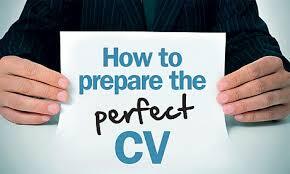over 9 years ago

There are so many different opinions on how to write the perfect cv and often this can be quite a daunting challenge especially if you haven’t had to write one for a while. Your cv however is one of the most important documents in your life as it is essential to your career and how you are viewed by a potential new employer or recruitment consultancy. Do take the time to ensure you are happy with how it looks and that it is an accurate reflection of you and your achievements in your career.
Employers and consultancies don’t have time to read between the lines, so the more you do to show how great you are for the job you’re trying to get the more chance you’ll have of getting it.
Remember, the reader will be asking themselves two very basic questions:
-
Can you do the job?
-
Will you suit their company?
Make sure the answer to both of these questions is ‘yes’ by:
-
Moulding your CV to match what they’re looking for
-
Making it clear where your skills meet their needs
-
Pointing out the value you could bring to their organisation
Here are some of our top tips for writing the perfect CV:
-
Mind your language
-
Keep copy short and to the point
-
Avoid lengthy sentences and use bullet-points
-
Don’t refer to yourself as ‘I’ or by name
-
Make sentences more direct with such phrases as ‘Major achievements include’
-
Use the past tense to describe your career (‘Led a team of…’)
Proof read
-
We can’t stress enough the importance of checking your CV for spelling and grammar errors, as a mistake could cost you the job
-
The worst thing you can do is to say in your cv that you have great attention to detail and them make mistakes. The most common spelling mistake is the word “liaise"
-
A fresh pair of eyes can be invaluable when it comes to spotting the errors you may have missed, so ask someone to double-check it for you
Layout
-
Keep it clean and uncluttered, with plenty of white space and wide margins
-
Use the same font throughout, and make sure it’s a common one such as Times New Roman, Arial or Courier
-
For a guide on font size, use 10-12 point for your body text, and a maximum of 16 point for headings
-
Refrain from using capitals for entire words and always embolden headings
-
Ideally 2 pages and don’t include pictures and fancy artwork on your cv
Structure
-
Personal information
-
Include your name, address, telephone number and e-mail address — and if you have a website that will add value to your application, add that too
Personal statement
-
Your personal statement is your big chance to sell yourself. Think of it as a sales pitch — you have one chance to grab the reader’s attention with how great you are. It needs to be punchy and say what is special about you and what you aspire to do rather than just focus on what you have done before
-
Write a focused summary of what you have to offer, keeping it simple and snappy. Sum up your personal and professional attributes, taking into account the job spec
Work experience
-
Start with your current or most recent position and work backwards
-
Treat a promotion like a separate position
-
Provide a job title, start and finish dates, company name, and a brief description of what they do
-
List relevant responsibilities, achievements, duties and skills; describing the scope of your job, rather than giving a job description
-
If you've had a lot of jobs or a long career, you might want to summarise under such headings as ‘Previous employers’
-
Explain any significant career gaps, even if you’re not working
Qualifications, education, training and development
-
These usually come near the end of the CV, but if some qualifications are essential for the job and make you more marketable, include them after your profile
-
List professional and academic qualifications, degrees and executive programmes Include skills such as languages, technology, or vocational training.
-
It is highly competitive in job market and the industry is constantly changing so if you can demonstrate that you are adaptable and have a hunger for learning this will make you stand out
Hobbies and Interests
-
Don’t list all your hobbies. No one is really interested if you scuba dive or if you like going to the theatre! If you do really want to include your hobbies make sure you can back them up if asked about them in an interview
-
Sometimes, hobbies and interests can be relevant for the job you are applying for and if so then it's fine to include them. For instance, if you are applying for a role with a snowboarding brand then it would be useful to the employer to know if you are a keen snowboarder
References
-
You could include the names and contact details of your referees on your CV, or simply have them on hand for when they’re requested. Either way, make sure you know who is willing to represent you

